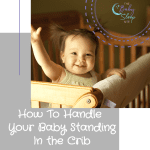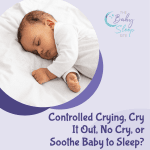 Is your baby crying in their sleep? If so, you are not alone! Learn these top 5 reasons why babies cry during sleep and how you should handle it.
Is your baby crying in their sleep? If so, you are not alone! Learn these top 5 reasons why babies cry during sleep and how you should handle it.
First, before you learn how to handle your baby crying in their sleep, let’s explore some reasons for crying. Here are the top 5 reasons babies cry in their sleep, in no particular order:
Why Do Babies Cry In Their Sleep?
- Hunger – The most obvious reason a baby cries in their sleep is due to a feeding time. Some babies do not wake up completely in order to signal to their parent to feed them. They may appear half asleep but eat eagerly. With babies waking from hunger, they will usually go immediately back to sleep even if they are put down in their crib or bed.
- Sleep Cycles – After the 4-month sleep regression your baby needs to transition between sleep cycles. The first ~5 hours (or so) are usually the deepest sleep. But, then your baby needs to cycle from deep sleep into light sleep and then back again on and off throughout the night. When babies do this, they often fuss or cry between sleep cycles for a few minutes (usually 5 or less, but sometimes 10 minutes). This is the equivalent of an adult talking in their sleep. If your baby returns to sleep quickly and without issue, there’s nothing to be concerned about. In general, we see this occur 1-3 times a night. If it’s occurring more frequently, there may be another reason or you need to review your baby’s schedule.
- Fever or Teething – If your baby is uncomfortable for some reason such as from a fever or teething, your baby may wake periodically and fuss or cry in their sleep. If your baby is teething, review our 3 proven tips to help with teething. And, if your baby has a fever, talk to your doctor about appropriate care for a fever. In most cases, your baby will feel better within a few days to a week in either case. If it has lasted longer, your baby may be crying in sleep for another reason.
- Needs More Sleep – If your baby wakes up crying, it’s very likely your baby needs more sleep than he or she has gotten during that sleep period. Yes, sometimes your baby wakes up for the day hungry enough to cry. But, most babies who wake up for the day crying have not finished their final sleep cycle. In this case, you may be getting your baby up prematurely. Similarly, at nap time, your baby may need a longer nap.
- Pacifier and Other Sleep Associations – The most common reason for babies crying in their sleep is due to sleep associations. This is particularly when they don’t go back to sleep without your help. This might mean they need you to replace the pacifier, rock them back to sleep, bounce them on a yoga ball, etc. They typically look like they are sleeping with their eyes closed, but are fussing or crying for you to “do” something. If your baby is waking up every 1-3 hours at night beyond the newborn days, this is the most likely reason. To change sleep associations (they aren’t all bad), you would likely do some baby sleep training.
How should you handle your baby crying in sleep?
First, unless your baby needs attention in some way, you would simply leave them be and let them go right back to sleep. This is especially true if they are only crying for a few minutes. If these short bouts of crying are disrupting your sleep too much, you may want to ditch your baby monitor.
If your baby needs attention to the crying, then you would clearly give your baby attention. For example, a dirty diaper should be changed though wet diapers tend not to be changed past 3-4 months old.
Take care that if your baby is crying due to a sleep association (see above), then coming up with a strategy for sleep training would be helpful to decrease the wake-ups. This will maximize both your baby’s sleep as well as your own.
If your baby seems to be eating at night excessively, you may want to consider when it’s time to night-wean.
Can babies have bad dreams?
Can babies have bad dreams? No one knows for sure, but the theory is that babies can definitely have a nightmare by age one and probably sooner. Since bad dreams and nightmares occur during REM and active sleep, it is possible that even newborns can have bad dreams. How complex they are would be difficult to figure out, of course!








